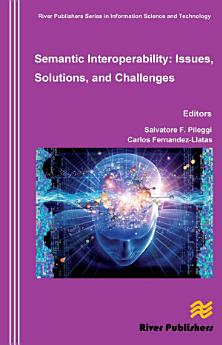Semantic Interoperability Issues, Solutions, Challenges
Salvatore F. Pileggi · Carlos Fernandez-Llatas
sept 2022 · CRC Press
Libro electrónico
164
Páginas
family_home
Apto
info
reportLas calificaciones y opiniones no están verificadas. Más información
Acerca de este libro electrónico
Semantic technologies are experimenting an increasing popularity in the context of different domains and applications. The understanding of any class of system can be significantly changed under the assumption any system is part of a global ecosystem known as Semantic Web.The Semantic Web would be an evolving extension of current Web model (normally referred as Syntactic Web) that introduces a semantic layer in which semantics, or meaning of information, are formally defined.So, semantics should integrate web-centric standard information infrastructures improving several aspects of interaction among heterogeneous systems. This is because common interoperability models are progressively becoming obsolete if compared with the intrinsic complexity and always more distributed focus that feature modern systems. For example, the basic interoperability model, that assumes the interchange of messages among systems without any interpretation, is simple but effective only in the context of close environments. Also more advanced models, such as the functional interoperability model that integrates basic interoperability model with the ability of intepretating data context under the assumption of a shared schema for data fields accessing, appears not able to provide a full sustainable technologic support for open systems.The Semantic Interoperability model would improve common interoperability models introducing the interpretation of means of data. Semantic interoperability is a concretely applicable interaction model under the assumption of adopting rich data models (commonly called Ontology) composed of concepts within a domain and the relationships among those concepts.In practice, semantic technologies are partially inverting the common view at actor intelligence: intelligence is not implemented (only) by actors but it is implicitly resident in the knowledge model. In other words, schemas contain information and the "code" to interpretate it.
Acerca del autor
Salvatore F. Pileggi, Carlos Fernandez-Llatas
Califica este libro electrónico
Cuéntanos lo que piensas.
Información de lectura
Smartphones y tablets
Instala la app de Google Play Libros para Android y iPad/iPhone. Como se sincroniza de manera automática con tu cuenta, te permite leer en línea o sin conexión en cualquier lugar.
Laptops y computadoras
Para escuchar audiolibros adquiridos en Google Play, usa el navegador web de tu computadora.
Lectores electrónicos y otros dispositivos
Para leer en dispositivos de tinta electrónica, como los lectores de libros electrónicos Kobo, deberás descargar un archivo y transferirlo a tu dispositivo. Sigue las instrucciones detalladas que aparecen en el Centro de ayuda para transferir los archivos a lectores de libros electrónicos compatibles.




